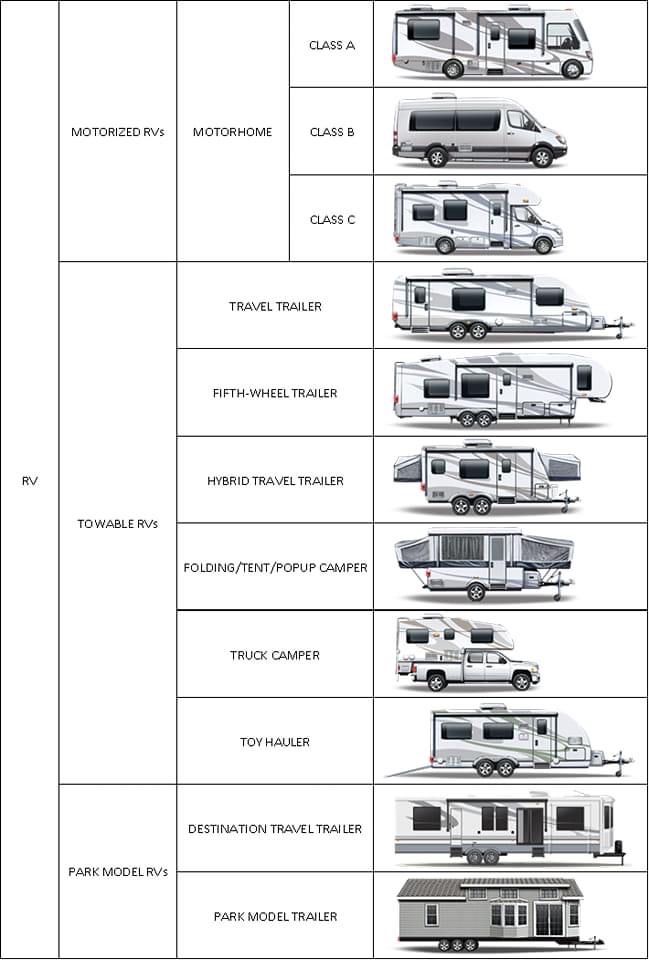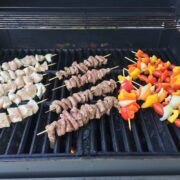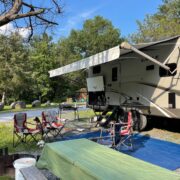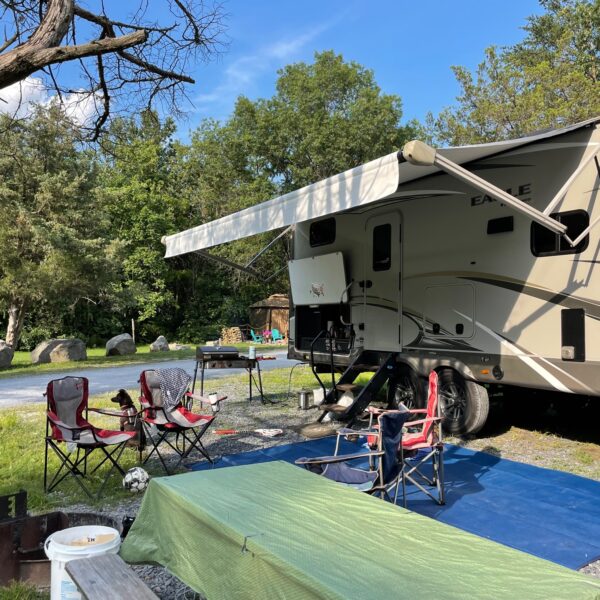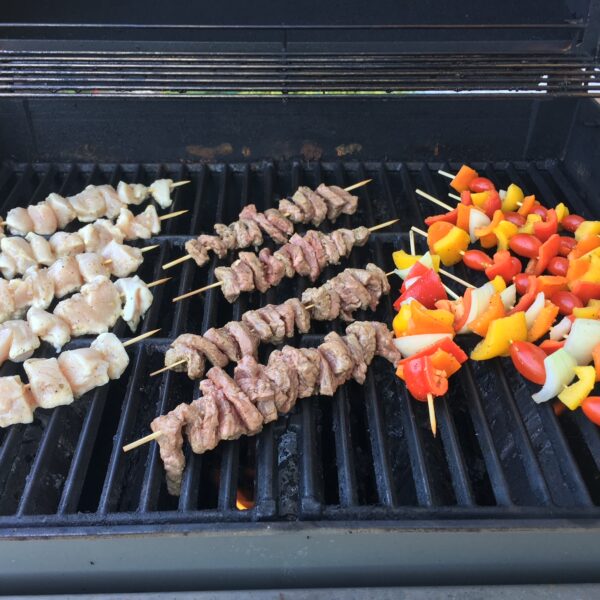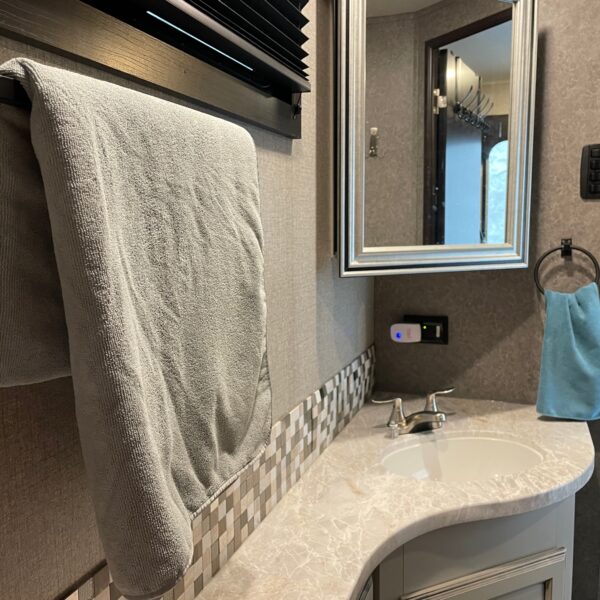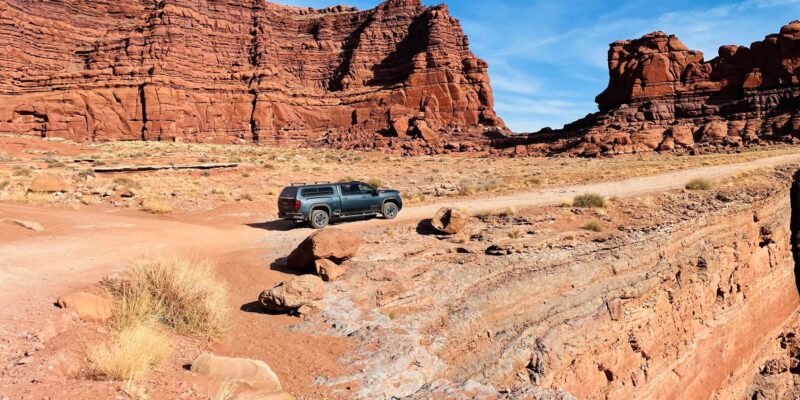
When you think about buying an RV, you will have a lot of questions. We have compiled a number of “New RV questions” and we will continue to add to this article. In no particular order, here are some quick answers to common questions asked by those new to RVing. Some might be questions from your friends and family when you tell them you’re going to buy an RV. Click on the carrot/down arrow to see our responses.
What does “RV” stand for? What’s the difference between RVs?
RV stands for Recreational Vehicle and it’s generally used as a whole category. Some people also use the term Camper, which is another general term for the same thing (this can also vary a bit by region). Within the category, there are many types of RVs. There are motorized RVs, towable RVs, and RVs designed to be parked and not be relocated often. We lean toward the term RV when talking to outsiders, as in “we are going RV-ing”. It lumps everything together and when we say “we are going Camping” they often picture more of a tent-like rugged experience.
Is it expensive to own and/or maintain an RV?
If you have the passion and desire to start RVing, consider that you may not be able to afford the perfect RV of your dreams, but you should get started with whatever RV you can afford that allows you to start this journey. It’s not unusual to trade in and upgrade after a couple years.
RV living is a way to travel while bringing the comforts of home along with you.
Michaela Cavallaro
New vs Used RV
It can be expensive to own and maintain an RV but it doesn’t have to be. If you buy a new RV, you’ll be paying top dollar, but you won’t have as much maintenance right away. You should expect a monthly payment to finance your RV (similar to buying a car), unless you are paying cash for it. You do need additional insurance for your RV (although it may vary depending on the type of RV).
Carrying a loan for the RV will lower your barrier for entry, but it will likely cost you a bit more in the long run due to the interest you’ll pay. In addition, just like cars, your insurance coverage minimum will be determined by a lender. The two main extra expenses for choosing a loan are interest and insurance premiums.
Regardless of the age of the RV (even new RVs), things often break or need adjusting and there is regular maintenance you should expect. Most things can be done yourself if you’re a little bit handy or willing to learn and follow YouTube videos. Dealerships and service stations charge more and take longer, but they’re available for those who aren’t able to do it themselves.
Older RVs are generally going to need more work, but you don’t have to spend as much upfront to buy them. If you plan to do the work yourself, then buying used and allocating a repair budget could enable you to save a lot. The trade-off is time. Whatever rig you buy, plan to allocate an Upkeep and Repair Budget.
RV Storage
An additional consideration is where you will be storing your RV when you are not traveling. If you don’t have the space or permission to store it outside your residence, you will need to look into storing it elsewhere. There are lots and garages for this purpose, or perhaps you can find a friend or family member with a large protected yard. We recently learned that veterans and military personnel can store RVs at some military bases for a small fee.
Furnishing your RV
Regardless of the age and type of RV, you will need to purchase some necessary items for RV travel. Many items are necessary to set up water, sewer, electric hook ups, leveling, etc. You will also need some basic bedding, towels, and toiletries. It can take a lot to outfit your RV but you don’t have to go all out. What you purchase for your new RV (or new to you) will also depend on your planned use. More adventurous or diverse travels and greater lengths of time will likely end up with you leaning toward extra gear. If you are thrifty, you may be able to find a lot of the kitchen and houseware items relatively inexpensively.
If you are buying a used RV, try to negotiate with the seller to include the kitchen items, bath, and bedding. You may pay a little more up front, but it’ll probably be less than buying everything new.
Overnight reservations
Another big expense is the cost of your overnight reservations. The cost of nightly reservations can add up if you are staying at private campgrounds. There are less expensive options if you are staying at state parks, national parks, or boondocking. You can also save money by getting long-term rates if you are planning to stay in one place for longer periods of time.
There are memberships you may look into, such as Thousand Trails, Harvest Host, and/or Boondockers Welcome. As part of your membership, you can stay at campgrounds and locations all over the country. It truly depends on your camping lifestyle, your location, and how often you will be able to utilize these options.
Budget, budget, budget
The recurring theme is this: Your best plan of action is to do your research and create a budget. Without one, owning an RV will definitely cost a lot more than you expect. Budgets can also keep you from an impulse decision on a glamorous RV that you can only afford to have parked in your driveway year round. Creating a good budget and making an informed purchase decision should alleviate most pitfalls and help balance expectations.
(If this only scratched the surface for you, consider reading our more thorough response at https://embarkrv.com/expenses-of-buying-owning-an-rv/).
Am I crazy for wanting to travel for extended periods in an RV?
Crazy?
No, not at all. At least, we don’t think so… well, maybe a little. But, if you don’t do some crazy things in life… are you living your life to the fullest? RV living is not for everyone but the benefits definitely out-weigh the challenges. We have gotten to travel and see more of this country than we ever imagined we would be able to do. It can be hard living in such small quarters, but it also creates a bond and experiences that are priceless.
Our Experience
We aren’t technically full-time RVers. No, we didn’t sell our house and hit the road with total freedom. But we did equip our RV with all of the things that a typical full-timer would need. This is because weren’t just doing a few trips here and there. We originally set off on a 6 month RV trip during all of the unknowns of COVID. We were full-timing it (for a 6 month stint). This was a great way to dive into what it’s like to live in our RV full time.
We jumped in knowing we wouldn’t be back for six months or more. Our plans were flexible based on how the country continued to handle the COVID situation. In about six months, we were covering most of the U.S. and would experience all the seasons. We had to pack for so many different activities and climates. Grocery stores were also hard to rely on for stock and rationing certain items (like toilet paper). We decided that we would provision enough to be able to last 3 months. Having 3 months of food on hand would ensure we would have no problem turning back from our furthest point if we had to. Thankfully, we were able to find everything we needed on the road.
We were new to RVing and made this all work. It honestly went so smooth… far better than we ever imagined. It was an amazing experience and for the most part, everything that we were worried about washed away as not a big deal (or never came into reality).
The addiction begins
After returning home, we were eager to go back out. We immediately planned a last minute two week centered around Memorial Weekend. Then planned a late summer trip to the Northeast. Now we are looking forward to our big six week long summer trip where we will cross the Northern part of the U.S. to complete the rest of the lower 48 states and all of the National Parks within them. We mention this to show how addicting adventure can be. It never would have been possible if we didn’t muster enough courage to start.
How often and how do you go about filling propane?
Even through winter months, we did not go through a lot of propane, as we often used our built-in fake fireplace space heater at night rather than the furnace. If you use your furnace or do a lot of cooking, you’ll use more propane. We only refilled our two 30 pound propane tanks once in about 6 months of mostly Winter travel. To us, that didn’t seem like a lot. We were expecting to refill more frequently.
Most large campgrounds (ie. KOA, Good Sam, RV resorts) have propane refilling stations near the entrance. They refill your tanks and charge you only for the liquid propane used, by the pound. This means you don’t have to wait until you are empty, you can top off at any time. If your tanks are removable (like ours) you can bring them to the tank refill station without moving your RV (we had one campground that even picked up our tanks and delivered them back to us). If your tank is fixed to your RV (like most motorhomes), you will need to drive up next to the refill station and turn your engine OFF while they refill your tank. Sometimes, it’s easier to just stop at the propane refill station when arriving or departing from the campground (then you don’t need to shuttle your tanks around).
Sometimes you need to wait for a specific propane operator, so you should check with the main office when you arrive or before you need to fill up. They typically allow you to add the charge to your bill rather than having to pay separately for the propane. If you are not at a large campground, you can check your local truck stop to see if they offer propane services.
Should I turn off my propane when driving?
This is a commonly debated question, with strong opinions. Unfortunately, the debates will rage on as there are no laws deciding the outcome… with the exception of some tunnels, bridges, and ferries. We do not typically turn off our propane when driving, unless we know we’re going through a tunnel. Our refrigerator runs on propane when not plugged in, but it generally stays cold for a while if we don’t open the door.
We have a 2-way refrigerator, so it only runs on 120v electric or propane. If we had a 3-way (like our old pop-up camper), it could run on battery while driving. Due to only having to choose propane on or no refrigeration, we opt for the refrigeration. We usually keep it well stocked (freezer too), which can help it maintain cold without power. But the other problem is that our refrigerator does not have a compressor. Compressor refrigerators cool much faster. With that you can get back to cold faster to recover from it being off during travel time. We also have longer drive days than most. If we are only going 3 hours, we can easily shut off the propane. But an 7-10 hour day could be trouble for our food.
Moving forward, we would like to be more diligent in turning it off on drive days, simply to reduce the risks. GasStop is a safety device, that we have added, that can cut the flow from your tanks if a leak is detected. We don’t have an inverter installed yet. But, once we add that… we should be able to use the batteries to power the refrigerator while driving and no longer take the added risk of keeping a propane tank open just for the refrigerator.
What are the different tanks? And who dumps the gross stuff?
There are three types of tanks in an RV.
Fresh Water Tanks hold fresh, clean water, which pumps through to your faucets. If you are using city water, you by-pass the fresh water tank and use water directly from the spigot (non pump needed, the pressure comes from the water source). When you aren’t on city water, your water pump will pump water from your fresh water tank through to your faucets.
Gray Water Tanks are holding tanks for your used water coming from the kitchen sink, bathroom sink, and shower. This is dirty water to dump, but it is NOT the toilet water.
Black Water Tanks are the holding tanks for your toilet waste.
While it’s not a popular job, hooking up sewer hoses and dumping your tanks doesn’t have to be a messy or smelly job. Steve usually takes care of our tanks, but I try to stay close and keep him company or lend a hand.
Do you really shower in and use your RV bathroom?
Yes! We use our RV bathroom all the time, rarely using campground bathhouses or rest stops. We know many travelers who prefer not to use their own bathrooms so they don’t have to dump tanks as often. Not all RV bathrooms are spacious, but ours is quite large. We have more than enough room in our stand-up shower, to move around and shower comfortably. When we are hooked up to city water and sewer, we have plenty of hot water and tank space to take a nice shower in the privacy of our own bathroom. Your holding tank sizes can make using your bathroom facilities more convenient. If you don’t have large Black and Grey Tanks your won’t be able to go as long between dumping them.
It’s so convenient to have a bathroom with us, whether we pull over to use the bathroom while driving or someone needs to use the bathroom in the middle of the night. It doesn’t smell, doesn’t take long to clean, and it’s only us who use it. Additionally, our first 6 month RV trip around the country was during COVID heightened restrictions. Most campgrounds had their bathrooms and laundry facilities closed and required all campers to be self-contained. At that same time, it was also rare to find a public bathroom available on drive days. We love the convenience. It was also the only way that our trip was possible.
What kind of gas mileage do you get?
We call it a fuel stop, because our tow vehicle runs on diesel, not gas. Fuel mileage will vary greatly. Our 2020 GMC Sierra 2500 is a diesel and gets about 19 mpg when not towing. While towing a 10,000 pound travel trailer, we range from 8-10 mpg. We see a larger drop in fuel efficiency when we drive faster on high speed highways and in mountainous regions.
If you want to maximize your fuel economy, avoid routes that have a lot of uphill pulling and keep your top speed under 60 mph and take your time getting up to speed. Trailer weight has a big impact. We know some RVers with similar tow vehicles but travel trailers that are 20% lighter and their mpg while towing is 11-13 mpg.
Is RVing safe?
Without looking up statistics on the criminal activity around RV parks and campers, we have felt very safe while RVing. We do a lot of research before booking campgrounds, and we tend to avoid the ones with low ratings and poor reviews. We have found that RVers look after one another and notice when there are unusual vehicles or people roaming around the campground.
If you stick to well-reviewed RV parks, state, and national parks, you should feel safe. Even though we generally feel safe, we still lock our doors, use bike locks, and try not to leave too much loose outside our RV. When it comes to petty theft, it is usually a crime of convenience… if your items aren’t the easiest to walk away with, they are likely to stay put.
How do you do laundry?
Most campgrounds have laundry facilities on site. Depending on how large the campground is, they may only have 2 washers and 2 dryers. If you arrive early or the campground isn’t crowded, you can get your laundry done. At some larger campgrounds, they have more machines, but they always seem crowded at the times convenient to do laundry, and not all machines are in working order.
Most machines still utilize quarters, so plan to have many quarters handy. You also want to be timely to switch your laundry over so others don’t have to wait or feel compelled to remove your clothes from the machine. You will need to use your own detergent and fabric softener, so keep some handy in your RV.
On our long trips, we bring our own washing machine and drying system, which has its advantages. It’s costly to purchase, and you cannot wash as much at once, but it’s very convenient.
How do I know if my truck can tow an RV?
Depending on the RV you are looking at, it will likely weigh between 2,000 and 18,000 pounds. You also need to factor in the total weight once loaded with water, food, and all the stuff you fill it with. Many SUVs can only tow between 2,500-5,000 pounds, although some large SUVs can pull nearly double that. If you want to pull anything more than a very light-weight trailer or pop up, you’ll likely be looking at a pick up truck for higher towing and payload capacity. When assessing a match between tow vehicle and RV, you’ll need to look at the towing capacity and the payload for the vehicle you have or are looking to purchase.
Tow Capacity
Towing weight capacity is the weight of what you can pull behind the vehicle (horizontal load added to the vehicle). Unfortunately, most people only look at this number when deciding what they can tow. This is often the only thing that a car or RV salesman will talk to you about. They either don’t know or don’t care as long as you buy what they are selling. This is likely the biggest reason for many people having poor RV towing matchups. Its not only a safety risk but can cause major damage to your tow vehicle and RV (even if not immediately visible). Some are lulled into a false sense of security upon successfully towing their RV without any known trouble.
Payload
Payload is how much weight the vehicle can hold (vertical load added to the vehicle). The payload capacity is not fully available for what is being towed… first it needs to account for the weight of passengers and anything in the vehicle or bed of the truck. The good news is that the only part of the towable RV weight that needs to be accounted for on your tow vehicle’s ratings is the tongue weight. Tongue weight is the vertical load that the trailer exerts upon your tow vehicle’s hitch (that is why the tow vehicle needs to account for it within its payload calculations).
Underpowered vs Overpowered
It is safer to have an over sized and over powered tow vehicle rather than just barely having enough power to pull your trailer. We haven’t come across anyone who has complained about having an overpowered truck for their RV. We have seen many underpowered vehicles obviously pulling a mismatched RV. You can buy a new RV and new truck (or tow vehicle). Or you can size one to the other. If you will be keeping your current vehicle, this will likely be one of your biggest limiting factors in searching for a towable RV. It must safely fit within your tow vehicle’s limits.
Some people think it’s okay to stretch their vehicle’s limits (and some blatantly ignore it or don’t know how to truly evaluate the numbers). This not only a makes for a bad towing experience for the driver, but it is also illegal. Even worse, if you are in an accident your towing calculations will be the first thing that the insurance companies examine… looking to put the blame fully on you for towing beyond your approved limits, negating your coverage.
What do you do for internet and is it reliable?
This can become a complicated answer… when we travel, we are also working full time and need a reliable internet connection. Sometimes we rely on cellular service to help us create a hot spot from our phones. We have both Verizon and AT&T sim cards, so we can usually find a cellular signal with one of them. In addition, we have a directional antenna we can raise and point at a tower to get a stronger signal. We have a cellular modem and router (all in one) which adds to our network along with a fixed rooftop antenna.
Starlink, the satellite savior?
Starlink is an interesting and viable option for the future, but it was not available when we first planned out our networking solution. We are excited by seeing some good feedback on it now and may consider adding it in the future. We spent a lot of time and money to create our RV network. This is not something everyone needs. For us, reliable internet was the keystone of our ability to work remote and travel the country. We were willing to spend more for the one thing that made the entire trip possible. If we were solely RVing for vacation, we would have been happy to be as disconnected as possible.
Due to our need to have reliable internet access for work, we tried to stay close to highways or on the edge of larger towns/cities. This typically ensures we have a stronger internet connection. When deep in the mountains or national parks, we generally don’t expect to have a connection, which is why we tend to take vacation those days or visit those areas on weekends when we do not need to be connected.
Campground internet
Campground internet doesn’t exist. Okay, they may claim it does… but you should not believe them. You should consider yourself lucky if you can connect at all, even then, streaming YouTube is unlikely. More and more locations are adding internet as an amenity, but you will not be able to rely on it for remote work. Would you really want a bet your source of income on it? Not us… and that proved to be the correct choice. We rarely found a campground that provided us with better internet speed test results than our cellular coverage. To make it worse, our test were in off-peak season and off-peak times. Forget finding any campground wifi bandwidth during peak season with the campground full of families. More and more, families are using multiple mobile devices, which utilizes even more internet bandwidth.


